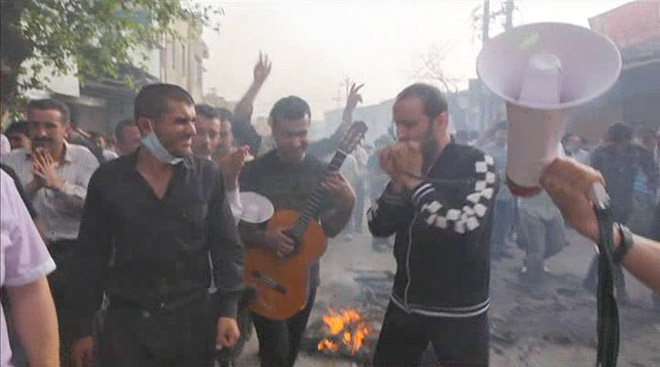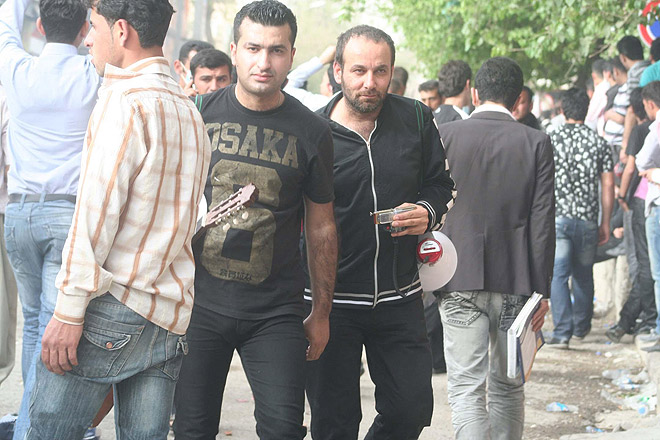This Lemon Tastes of Apple
Kurdistan- Northern Iraq was called by Sadam, Allah’s paradise on earth. I started to understand the irony after 1988 when I was told by some of our relatives who survived the chemical attack in Halabja, that the chemicals smelled after apple.
The video documents an intervention undertaken by the artist on April 17th 2011 in Sulaimany, during one of the last days of the civil protest that consisted of two months of struggle. The international media never properly covered the protest, which was finally brutally smashed by the armed forces of the local government. The matter has been somewhat swept under the carpet: as if this protest is an unwanted one, as if happening not as a revolution against officially annoited tyrants, like in the other Middle-East countries, but as a surge against at least theoretically democratically elected politicians. This unfitting protest, a strong claim for transparency, participation and equal access to the country’s wealth, spreads across generations, professions and cities so it can be assumed that it is producing an entirely new basis for the further development of a civil society in Kurdistan. The wave of protests started on February 17th in the Kurdish region of Iraq and continued for eight weeks at the cost of a minimum of ten deaths and four hundred injured in clashes between citizens and militia.
The harmonica motif by Ennio Morricone, from the movie “Once upon a time in the West”, which the artist previously used in his performance, “With Jim White: Once upon a time in the West”, is transformed here into a signal of protest, a call to go forth, and a song for the unexpressed. Hiwa K plays harmonica, with Daroon Othman playing the guitar utilizing megaphones. The day of performance is the last day of legal demonstration, which was subsequently prohibited and when the stage from which the activists were addressing the people was burnt. The artist came twice with the protesters from the Sarai Azadi [Freedom Square] towards the frontier, before and after gas attacks. The inhalation of the teargas through the harmonica internalises again why the protest broke out. The work occurred within the protest and is not a work about the protest.
The title, “This Lemon Tastes of Apple”, refers to the use of gas against Kurdish people in a genocide attempt. When, in 1988, Saddam’s forces were pouring suffocating gas into Halabja and other Kurdish settlements, the gas had a smell of apple. The smell has since had a strong association in the political memory of the country. During the recent months of demonstrations, the people of Kurdistan were attacked by teargas, deployed by their own Kurdish regional government. To relieve the impact of the gas the protesters used lemon as an immediate detoxifying agent. The fruity smells connect the two ends of this 23-year-long history.
The work has intentionally not been translated into English. The words of protest remain in their own language and are not adapted to the rhetorical frames of protest elsewhere. The particular is not translated here; the work brings through the image and the music the atmosphere of the momentum. The assumption is that the content of the protest is often the same but the event of participation is always singular. It operates in a communicational gap but does not expose a lack of communication. It rather remains within the omitted, the overlooked and the abandoned.
Written with Aneta Szylak

